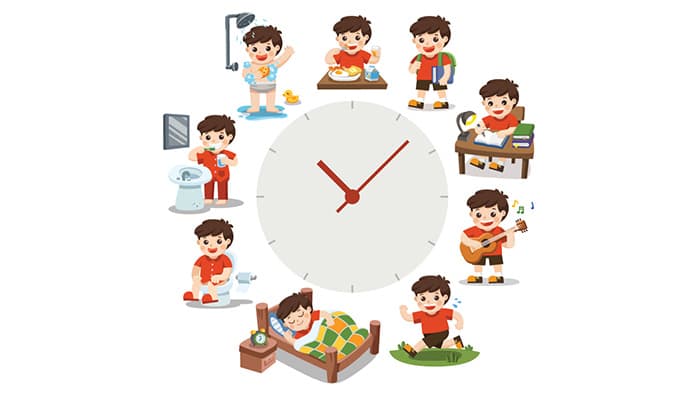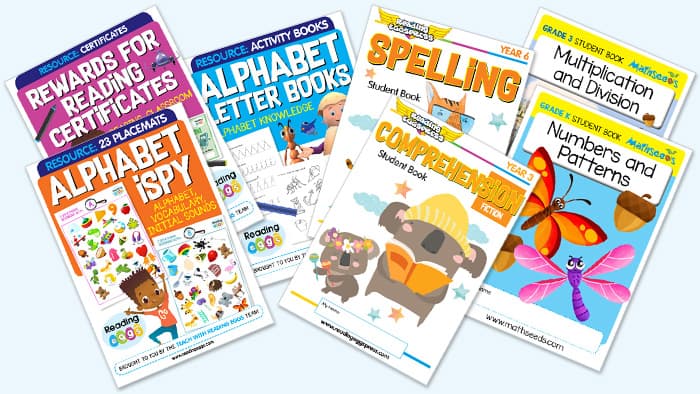


Top 12 Homeschooling Tips that Every Parent Needs to Know

Setting up a new home learning routine for your kids? Try our helpful tips below and explore free home learning resources designed by experienced educators.
Tips for Homeschooling
Are you taking the leap into the world of homeschooling? It can feel daunting at first, however, with the surge of quality digital learning technology like ABC Reading Eggs, there's support out there for parents of homeschoolers who aren't sure where to start.
Setting up a homeschooling routine for your little ones may take some trial and error – but it doesn't need to be a nightmare. Try these simple tips below and you'll have your homeschool routine running like clockwork in no time!
12 Homeschool Tips for Parents

1. Establish a routine and follow a schedule
It's no secret that kids flourish when they have a routine to follow. According to our research, routines help young children to build relationships and gain a sense of belonging and self‑confidence. As children develop, having structure and routine in their lives helps them to develop their own independence and adjust to change more easily.
Routines help children to feel safe, relaxed and open to learning. You might also find that developing a routine helps your kids to focus. But (and this is a big but), getting young children to follow a routine is easier said than done. So, here are some tips to help get you started with homeschool routines.
Stick to a reasonable bedtime during the week and an early wake‑up in the morning. Going to bed and getting up at the same time every day, even on weekends will help cement your children's homeschool routine.
Get your children in the habit of making their beds in the morning. This helps build momentum for the day by completing a small task and helps build the discipline needed to work in a homeschool environment.
This quote below by a retired Navy SEAL Admiral sums up why making your bed is important (he even wrote a book about it).
“If you make your bed every morning, you will have accomplished the first task of the day. It will give you a small sense of pride and it will encourage you to do another task and another and another. By the end of the day, that one task completed will have turned into many tasks completed… And, if by chance you have a miserable day, you will come home to a bed that is made–that you made–and a made bed gives you encouragement that tomorrow will be better. If you want to change the world, start off by making your bed.” – Admiral William H. McRaven
Make sure your child has breakfast and gets dressed each day before starting their online learning.
Maintain a daily schedule with your homeschool’s start and finish times, as well as breaks and opportunities for play. You can also include regular tasks and activities, but it’s important to avoid being too rigid – allow for some flexibility in your day.
Write a daily 'To Do' list. Having everything laid out in advance will help your child stay focused and on track. Crossing items off the list throughout the day is encouraging and just feels great!
Explore hundreds of online home learning resources for free
Gain access to hundreds of online reading and maths lessons, interactive learning games, live reports, 500+ worksheets and more to support your child's learning at home.
2. Communicate
Talk to your child each morning about what they are going to do that day, going back to their To Do list and working through it with them. This is a great opportunity to clear up any queries they might have and make sure they have what they need to complete the day's homeschooling activities. Go over timings for tasks and set deadlines in order to keep things moving forward.
At the end of each day, set aside some time to go over the day's homeschool activities. Encourage your child or children to tell you what they have been learning and give them some praise! Some children may feel a little bit isolated when homeschooling so a little bit of encouragement goes a long way.
Keep in contact with your child's teacher or tutor (where possible). Email them any issues or questions that may pop up and find out what their expectations are. Ask teachers or tutors what other students have been struggling with because sometimes kids will be stuck, but won't ask for help. Kids are always 'fine' when you ask them, but going into a conversation armed with specific questions, you should be able to uncover any issues and nip them in the bud.
3. Create a homeschooling space

Create a designated space for your child to work and study in. Make sure there is a table and a comfortable chair to sit on. Ensure that it is a safe space, with adequate light, ventilation, is quiet and has access to the resources your child might need.
Try to keep the space free from distractions like their toys, phones, video games, television, etc.
Internet and tablet/phone access may be required to complete some homeschool tasks, so using tools like app blockers or parental controls on devices can help you cut out distracting websites/apps that draw attention away from their school work.
Also consider where your homeschooling space will be located. Will you need to sit at the kitchen table when you’re working with your child? Where will you store your administrative paperwork and teaching resources? Which leads us to the next tip...
4. Stay organised
Staying organised will help to avoid a chaotic homeschooling experience.
Keep track of important dates in a calendar, including examination dates set by your local educational body.
Maintain a record of your child’s homeschool attendance each day.
Set up binder filing systems for each subject area and another for administrative paperwork.
5. Take breaks
Schedule lesson times with regular breaks inbetween. Allow your child the opportunity for some physical recreation to get the blood pumping. Give them a nudge to spend some time outside so they can walk, run, play, and let off steam.
Children's attention span increases with age, so while a younger child might need a short break every 10 to 15 minutes, an older child or teenager would only need a break after a full lesson block of 40 minutes. Be mindful of this when planning your day.
Healthy snacks and lunch are a must throughout the day. Some parents and children may find it easier to stick to a similar breaktime schedule as a school, with recess, lunch and breaks between lessons. You might even find it helpful to pack lunch and morning tea for your homeschooler before the day begins!
6. Encourage social interaction

Some children may find the concept of homeschooling scary and isolating. However, it isn't usually the case. If you choose to homeschool your child, just be aware that they are missing the daily interaction that kids usually get in the classroom. With this in mind, take extra time to explore sports, art classes, dancing, martial arts or something else.
There are endless activities to get homeschool kids involved with that will give them the social interaction they need. If you're feeling really brave, you could even encourage your child to start a band (your neighbours will love it!).
7. Collaborate with other homeschoolers
There might be other local homeschoolers nearby you can meet up with to discuss your homeschooling concerns and share your learnings. Your child could also spend time interacting with their children and you can organise group trips together.
Join an online homeschooling group. These can be a great resource for homeschoolers to learn from the experience of others.
Don’t be afraid to ask for help. Any problems you are facing adapting to homeschooling life have probably been experienced by other homeschoolers. Ask the ‘silly’ questions. Be honest about your own experiences.
Attend a homeschool conference to learn from homeschooling experts and meet other homeschoolers.
Explore hundreds of online home learning resources for free
Gain access to hundreds of online reading and maths lessons, interactive learning games, live reports, 500+ worksheets and more to support your child's learning at home.
8. Set goals
Goal setting is not just writing a list of things to do. Setting goals with your homeschoolers is going to help keep them motivated and set them up for life. Goals can be broken down into categories, for example, school goals, sports goals, savings goals, music goals, etc, making the exercise a bit more exciting.
Goals should follow the S.M.A.R.T. rule. This means they should be Specific, Measurable, Attainable, Relevant and Time bound.
Specific: This means going into detail with what your child wants. Learning to read and write sounds like a good idea. But, at what level? How will milestones be measured? Dig deeper with this element.
Measurable: Can it be measured? Using the learning to read example again, your child needs to be able to measure their reading skill. You could do this by selecting a book, grading, their level in ABC Reading Eggs or a combination of these.
Attainable: Can the goal be achieved? Going for your dreams is great, but make sure the goal can be attained within the limits of reality and within your child's time limit.
Relevant: Your child's goals should align with what they want. Not someone else. The goals need to be theirs, things that are important to them.
Time Bound: This is simple. Come up with reasonable time limits with your children when setting goals. The aim is to stretch and create urgency, but still be within reason.
9. Set up a rewards system
Setting goals is great, but what kids really get excited about is the reward (who doesn't love a reward?). Setting up a chart, with scaled rewards based on the difficulty of different tasks will help keep your kids on track and make it easier for you to manage their homeschool learning throughout the day.
Breaking things up into school subjects, chores, extra curricula and then daily, weekly and monthly tasks is a great way to start. From here, you can decide with your children what they will get as a reward based on the difficulty of the task.
Using things like gaming and TV time as a reward, instead of an expectation, can help with screen time issues. For example, you might allow an extra half an hour of gaming time in exchange for your child hitting their learn-to-read goals through the week.
10. Know the requirements
Make sure you know the legal requirements for homeschooling in your area and check that you’re in compliance.
What subjects is your child required to learn and how is this assessed? Is there a formal examination requirement? Is there a specific curriculum you need to follow? If there’s flexibility, decide whether you want to use a curriculum or take a more relaxed approach.
Research your homeschool options. There are many ways to homeschool. Take some time to explore the alternatives before you start.
11. Remember why you chose to homeschool
When things get stressful it can be easy to forget why you chose to homeschool in the first place. Write these reasons down and keep them safe. You can display them in a frame so they’re always visible or put them in your admin binder to refer to when needed.
12. Relax and have fun!
Don’t panic if things don’t always go to plan. Some days will be harder than others. On those days it might be best to switch things up and let your child step away from the books.
Include some fun activities throughout each day and plan for trips outside the home to enrich your child’s learning experience.
If you are looking for more ideas to help you with your homeschooling journey, keep reading! Below you'll find some Free downloadable resources, a list of 40 homeschool activities to inspire you and a free trial to ABC Reading Eggs.
Learning from home? Download FREE home learning resources

Download a range of free home learning resources designed by experienced educators to support your family. Your child can practise their alphabet, spelling, comprehension, handwriting, reading, and mathematics skills with complete workbooks, activity sheets, and more. Search by grade level, subject area, and focus skill.
Explore hundreds of online home learning resources for free
Gain access to hundreds of online reading and maths lessons, interactive learning games, live reports, 500+ worksheets and more to support your child's learning at home.
homeschool-reading-writing-ideas-jump-link
40 Homeschool Ideas
Homeschool Reading, Writing and Language Building Ideas

Cut out some pages from a magazine and write a story about them
Write a letter to a family member or friend you haven't seen for a while
Design and make your own crossword puzzle
Learn how to say your name in sign language
Find out how to say hello and goodbye in different languages
Learn your favourite poem and perform it to your family
Create a scavenger hunt with letters or words around your home. Write clues
Look for a list of things in the home that start with each letter of the alphabet
Organise all your books into alphabetical order, by title or author
Write a list of things you are grateful for
Interview your friends or family members and create a newspaper or magazine article about them
Write your life story so far.
homeschool-maths-counting-ideas-jump-link
Homeschool Maths and Counting Ideas

Count all the windows in your house. How many are open?
Collect 15 leaves and order them according to size or area
Draw around your hands and feet on some squared paper. Count the total area
Weigh five toys and order them from heaviest to lightest
Find the volume of some different sized stones by dropping them into water and recording how the water level rises. Put the stones in order according to volume
Count how many shoes are in your home. Who has the most? Who wears the biggest shoes? Find a way to record the answers.
homeschool-art-ideas-jump-link
Homeschool Art Ideas
Create some tessellating patterns (patterns of shapes that fit together without any gaps)
Draw the plans for your dream home or bedroom. Design the different areas
Draw some 3D objects. Can your family figure out what they are?
Design and make a poster to encourage people to wash their hands properly
Perform a song or play for your family
Find some old photographs and make a collage
Design a new uniform for your favourite team, or for your school
Get some crayons and do some bark rubbings outside. Cut them up and turn them into pictures.
homeschool-science-ideas-jump-link
Homeschool Science Ideas
Learn how to write your name in Morse Code
Look in the yard for some bugs. Draw or take pictures to create a bug catalogue
Find how many times you can fold a square piece of paper.
other-homeschool-activity-ideas-jump-link
Other Homeschool Activity Ideas

Bake a simple cake or some cookies. Measure all the ingredients carefully
Make a new zoo enclosure using blocks, playdough or cardboard. Draw a plan of your model
See who can build the strongest and tallest tower from a pack of playing cards or paper and sticky tape
Make and fly paper planes. Measure the distance of each throw
Play a memory game. Put 10 items on a tray then cover them up. How many can you remember?
Make your own pet rock using paint and scraps of wool
Build an indoor obstacle course, or one outside if you have space
Create and complete a circuit‑training course
Try some family karaoke to your favourite songs
Think of six dance moves and number them 1–6. Perform the move on the roll of a dice
Make a pizza from scratch. This is a great opportunity to practise reading, measuring and time skills.
homeschooler-reviews-jump-link
Reviews From Some of Our Homeschoolers
“I just wanted to compliment the ABC Reading Eggs team on an excellent educational platform! Our son is 4 and with the current global crisis has been unable to go to kindergarten. I've experienced a range of emotions but mostly guilt because I feel he is missing out on the early foundations of education. Since using the app (started in early April) he is reading at an estimated 5.25‑year‑old level. He absolutely loves ABC Reading Eggs, it is something we can do together or on his own. Along with his vocabulary, his confidence has improved and speech is more articulated. He is stimulated and eager to learn so he can earn his 'critters' and certificates. He sounds out words in books and has passed all of the quizzes with a 100% score. Thank you for creating such a fantastic app for our kids. Particularly during this challenging time, I can rest assured he is steadily progressing and preparing for school next year.” – Elise & Blake
“In these difficult times, needing to homeschool my child, I just wanted to say thank you. We've been subscribed to ABC Reading Eggs for years and as such, it's been nice to approach homeschooling with confidence. I initially searched far and wide for homeschooling resources but nothing else compares. I rely more on the ABC Reading Eggs and ABC Mathseeds program than I do the work sent home from school to keep my child learning. Not only is it an optimal and exceptional program for education, it motivates my child to complete his work from school so he can get onto ABC Reading Eggs and ABC Mathseeds app. He loves it and so do I. He follows these lessons everyday with the corresponding activity sheets available… Thank you for making this program a high‑quality platform for learning. Thank you for making it affordable month by month. And thank you for making it enticing and entertaining to children. You couldn't have done better.” – Catherine
Explore hundreds of online home learning resources for free
Gain access to hundreds of online reading and maths lessons, interactive learning games, live reports, 500+ worksheets and more to support your child's learning at home.






